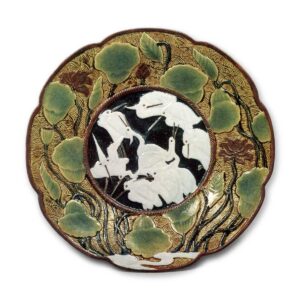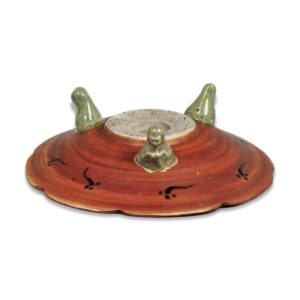

Height 6.8 cm, mouth diameter 22.1 cm, bottom diameter 8.2 cm
This dish has an eight-petaled circular floral pattern at the mouth and three sides of the bottom decorated with devil’s masks and animal feet.
The inside of the window is skillfully decorated with ten egrets, and the surrounding area is embossed with a lotus pond pattern, while the base is decorated with a floating pattern of blue sea waves.
Each of these is a relief work, and the freedom of expression, which is not found in molded works, is interesting.
Furthermore, the celadon glaze is used for the lotus leaves, the darker glaze for the lotus flowers, buds, and roped circular window, the thinner iron glaze for the lotus pond wave pattern, and the transparent glaze for the white heron and running water, all of which show the utmost sophistication for this period.
On the reverse side, eight Dingzho-style patterns are iron painted, and a thin layer of iron glaze is brushed on top of them.
It is not clear where this piece was fired, but the surface of the base of the faucet-like elevation appears to be similar to that of the Hyakumagama kiln.



